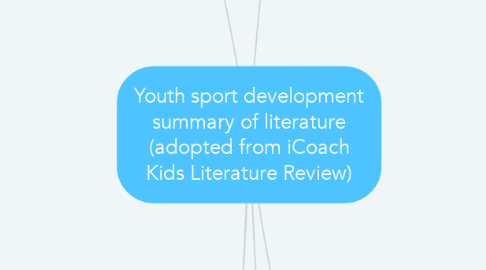
1. Shaping the environment & Building relationships
1.1. Creating a pedagogical climate
1.1.1. Coach - Athlete - (and parent) relationship
1.1.2. Fun is a key motivator. Research on what is fun.
1.1.3. Athlete-centered approach
1.2. The role of motivation
1.2.1. Enabling flow state
1.2.2. Mastery- v Performance-Orientation
1.2.3. Self-Determination Theory
1.2.3.1. Autonomy
1.2.3.2. Competence
1.2.3.3. Belonging / Relatedness
1.2.4. Intrinsic > Identified > Introjected > Extrinsic > Amotivation
1.3. Safeguarding and protecting children in sport
1.3.1. Structural and system considerations for creating safe environments
1.4. Environmental and inter-personal considerations for gender, ethnicity, diversity and inclusion
1.5. Effective relationships between supporting agents (parents, coaches, sport administrators)
1.6. Considerations for digital technology on the impact of young person's sport experiences
2. Conducting practices and preparing & managing competitions
2.1. Learning strategies
2.1.1. Constructive alignment (micro, meso, macro learning objectives with player engagement, coach behaviour, pedagogical choices and practice structure). Coach should be able to answer: WHO is being coached?; WHAT is trying to be coached?; HOW are we coaching it?
2.1.2. Skill acquisition theory
2.1.2.1. Mass, blocked and structured practice v random, variable and distributed practice
2.1.2.2. Self organisation strategies (to promote autonomy, connection and creativity)
2.1.2.3. Dreyfus Model
2.1.2.4. Drills v games
2.1.2.4.1. Teaching Games for Understanding
2.1.2.4.2. Game Sense
2.1.2.4.3. Ecological Dynamics Approach to Skill Acquisition
2.1.2.5. Feedback
2.1.2.5.1. Questioning strategies (to promote reflection)
2.1.2.5.2. Guided discovery and problem solving
2.1.2.5.3. Considerations for quality, quantity and timing of feedback
2.2. The role of competition
2.2.1. Measuring "success" in youth sport
2.2.2. Recognition that competition can be developmental and motivational
2.2.2.1. Competition must be developmentally appropriate
2.2.2.2. True competition v de-competition
2.2.3. Considerations for mitigating/managing negative adult behaviour that stems from competitions.
2.3. Perspectives on the role of parents supporting practice and competition in youth sport
3. Values & Beliefs
3.1. The importance of understanding one’s own values and beliefs in coaching
3.1.1. Coaching philosophy
3.2. The importance of understanding one's own values and beliefs as a parent involved in sport
3.2.1. Growth mindset
3.3. The importance of understanding one's own values and beliefs as a leader involved in sport
4. Vision & Strategy
4.1. How children develop from a bio-psycho-social perspective
4.1.1. Athlete development considerations
4.1.2. Considerations for talent identification and (de)selection policies
4.1.3. considerations for age/stage appropriate activities and policies
4.1.3.1. considerations for weighting fundamental movement skills v sport specific skills
4.1.3.2. adultification of youth sport
4.1.3.3. Relative Age Effect (and reverse relative age effect) + Maturation bias
4.1.4. structural and system considerations for key transition points and periods (including load, intensity, sampling v specialization)
4.1.4.1. Reseach on injury prevalence, burn out prevalence, drop-out and identify foreclosure
4.1.5. Coach/parent/administrators awareness about their role within broader development pathways of their respective young people / athletes
4.2. Developmental trajectories in sport
4.2.1. Structural and system considerations for recreational and performance orientated young people
4.3. Developmental outcomes of youth sport participation
4.3.1. Stakeholder management: defining programme / event outcomes and communicating with key stakeholders
4.3.2. Purposeful development of Physical, Psychological, Social, Technical, Tactical (PPSTT) & Life-skills
4.3.2.1. Values based coaching
4.3.2.2. 5Cs (competence, confidence, connect, character, and caring/compassion)
4.3.3. Physical Literacy Approach
4.3.4. Structural and system considerations for identifying, signalling and holding to account developmental outcomes
4.4. Sport as a tool for personal development
4.4.1. Physical (health) benefits of sport (are negated if participants does not develop life long love of sport/physical activity)
4.4.2. Social/emotional benefits (for these to be harnessed, require positive relationships with and support from peers, coaches and parents)
4.4.3. Cognitive benefits of sport and physical activity (including academic performance)
4.4.4. Sport as a vehicle for life skills (some life skill may be developed inherently through sport, while others will require purposeful intervention from coaches, parents etc, to introduce and develop these skills in young people).
4.5. Coaching curriculum development (sport specific)
4.6. Planning
4.6.1. Planning process for coaches
4.6.2. Planning process for sport leaders
4.7. The "business of youth sport": managing the (conflicting) drivers and constraints ($, performance, developmental outcomes, safeguarding children) within youth sport
4.8. Strategic and structural considerations for gender, ethnicity, diversity and inclusion
5. Reflection and learning
5.1. The why and how of reflection in coaching
5.1.1. Value of networks and communities of practice for reflection
5.1.2. Reflection on action; Reflection to action; critical reflection
5.2. The why and how of reflection for parents in sport
5.3. The why and how of reflection for leaders in sport
5.4. Continuous improvement approach
6. Understanding context
6.1. The relevance of the socio-political micro and macro context
6.1.1. The New Zealand context
6.1.1.1. History of youth sport in NZ
6.1.1.2. New Zealand Club-RSO-NSO context
6.1.1.3. The New Zealand Secondary School Context
6.1.1.4. The Value of Sport within a NZ context
6.1.2. Meso and micro systems (or politics) and subsystems that overlap the youth sport experience (family, church, peers, community, club, school)
6.1.2.1. Structural constraints affecting access to resources. Geography, location, travel, facility
6.1.3. The optics of coaches within society (what is a coach?; what is their purpose?; what value do they provide?; what does a good coach look like?
6.2. Future focus
6.2.1. Impact of technology
6.2.1.1. Media & Social Media and youth sport
6.2.1.2. Privacy and data
6.2.1.3. Coaching considerations for Wearables, AR and VR
6.2.2. Transformed work culture (more time for leisure). Implication on volunteering and participation.
